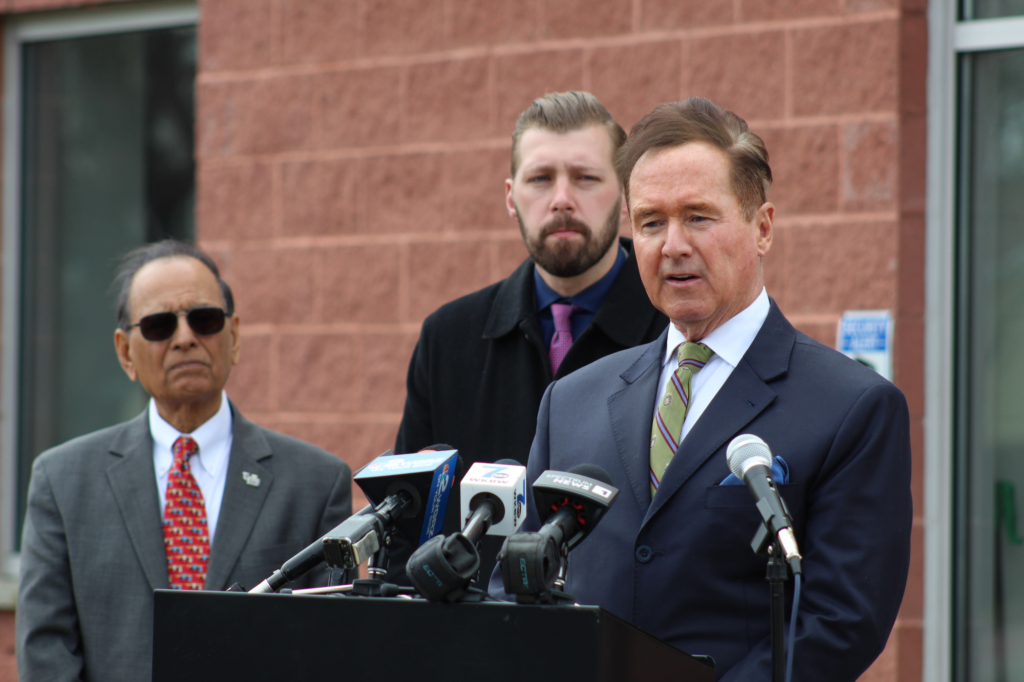
Congressman Brian Higgins (NY-26) announced $933,800 in federal funding awarded to the University at Buffalo School of Public Health and Health Professions. Secured by Congressman Higgins as part of the fiscal year 2023 budget, this community project funding will support a mobile health unit in medically underserved communities in Erie, Niagara, and surrounding counties in the Western New York region.
“Healthy lifestyles begin with access to healthcare. From regular appointments with primary care physicians, to enrolling in affordable coverage, far too many people living in Western New York’s underserved communities lack access to the resources to address their healthcare needs,” said Congressman Higgins. “The University at Buffalo’s mobile health clinic will build on existing partnerships to meet members of our community in greatest need where they live to provide comprehensive care. Thanks to this critical funding secured in the federal budget, we can eliminate barriers to care and make a long-term investment in a healthier future for our community.”
Time and time again, research has shown that lack of reliable transportation is a significant barrier to accessing healthcare services and keeping appointments, especially for people living in underserved areas. The federal funding secured by Congressman Higgins will allow the University at Buffalo to establish a mobile health clinic. The clinic will meet the immediate needs of families living in underserved areas in the Cities of Buffalo and Niagara Falls, as well as rural communities across the Western New York region, while training the next generation of medical, dental pharmaceutical, nursing, social work, nutrition, athletic training, physical therapy, occupational therapy, exercise science, and public health professionals.
Led by the University at Buffalo’s School of Public Health and Health Professions, the mobile clinic will assess health needs in these communities, as well as conduct screening visits and prevention services, deliver healthcare, provide referral to primary care service, and help individuals and families navigate the health services they need. It will focus on wellness and prevention with other services including health assessments, physicals, mental health evaluations, nutrition counseling, blood pressure checks, vaccines, diabetes assessments, and pharmaceutical counseling. Staff at the clinic will help patients secure appointments, manage transportation needs, assist with obtaining healthcare coverage, and overcome language barriers. Providing comprehensive care, the clinic will also improve access to other basic needs, like food and social services, that support general community wellness and economic security. Meeting members of the community in their neighborhoods, it will also provide the opportunity for the University at Buffalo, in partnership with the community, to develop long-term programs that respond to the health needs in each community it serves.
“As a public research university, UB is driven by our mission to partner with the members of our community so we can better understand—and best address—the health needs of our region,” said UB President Satish K. Tripathi. “By focusing on the needs of our neighbors who are medically underserved, we will work in concert with our community to achieve health equity—a goal that we have long shared with Congressman Higgins.”
Stationed at the Seneca-Babcock Community Association, this mobile unit will serve a wide range of about 30,000 constituents in the City of Buffalo. The University will also work to establish partnerships with agencies in Erie and Niagara Counties to regularly make the mobile health unit available to low-income residents living in both urban and rural areas across Western New York. The University at Buffalo will also provide these communities with access to their existing UB Mobile Dental Unit as often as possible.
Buffalo Common Councilmember Bryan Bollman said, “One of my biggest priorities as a council member is to reduce barriers residents face. Whether it’s food or medical scarcity, we need to provide residents better accessibility. I applaud the Congressman for bringing federal dollars into the district and stationing a mobile health clinic here at Seneca-Babcock Community Association.”
The Seneca-Babcock Community Association is committed to developing and enhancing the quality of life for residents of the Lovejoy district, including at-risk youth, adults, families, and seniors. Their goal is to deliver a strong sense of empowerment through participation in education, economic, social and health related programs and those goals we will support via this effort.
“We have already established partnerships with the Seneca-Babcock community, including a weekly food pantry run by members of our UB faculty and students. We will also work with UB Mobile dental unit on a regular basis to coordinate care in these regions. The funding provided by Congressman Higgins will allow us to expand our services and support to neighborhoods in greatest need,” said Jean Wactawski-Wende, Dean of UB’s School of Public Health and Health Professions and lead of the newly funded program. “With the funding of the mobile unit, our UB professional students will have the opportunity to serve the community, providing coordinated care across many health disciplines. We believe the program will serve as a national model for interprofessional practice.”
All WNY is made possible thanks to coffee and sleep deprivation.
We appreciate your readership. We like money, too.
